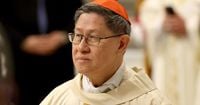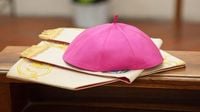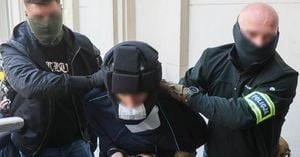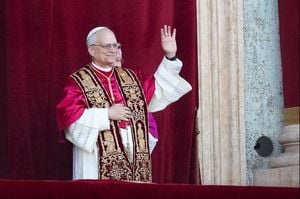The ongoing conclave has captured the attention of not only Catholics and the global press but also the betting market as cardinals gather to decide on the next pope and leader of the Catholic Church. According to data compiled by Forbes, bettors have wagered over $25 million (R$ 142.5 million) on Polymarket and $9 million (R$ 51.3 million) on Kalshi regarding who will succeed Pope Francis.
The conclave began on Wednesday, May 7, 2025, in the Sistine Chapel, with no clear indication of how long the process will last. Recent conclaves have typically spanned two to three days. On the first day, a vote is held, followed by four votes each day until a candidate secures the necessary two-thirds majority. If the required majority is not reached, black smoke is emitted from the Sistine Chapel, whereas white smoke signifies the election of a new pope.
Betting platforms like Polymarket gained prominence during the 2024 U.S. presidential election, where over $3.6 billion (R$ 20.5 billion) was wagered on the outcome. Shayne Coplan, CEO of Polymarket, has touted the platform as "the most accurate source of information on the internet," having correctly predicted Mark Carney's ascension to Prime Minister of Canada.
Who will be the next pope? Experts from the Vatican suggest there is no single clear favorite, although several cardinals are seen as strong candidates. This papal election is particularly difficult to predict, they say, because it represents the largest and most globally diverse conclave in history. This diversity is largely due to Pope Francis appointing over 100 cardinals from underrepresented countries, now eligible to vote.
“It’s really a much more complicated chemistry this time, as there’s also a fairly complex international situation affecting different cardinals and local churches in distinct ways,” remarked Massimo Faggioli, a theology professor at Villanova University, in an interview with NPR.
Among the favorites in the betting markets are Cardinal Pietro Parolin, Cardinal Luis Antonio Tagle, Cardinal Matteo Zuppi, and Cardinal Pierbattista Pizzaballa. On the second day of the conclave, May 8, 2025, Tagle gained strength, while Parolin continued to lead.
After three rounds of voting that did not yield a new pope, Tagle reduced Parolin's advantage. On Kalshi, Parolin holds a slight edge over Tagle, with bettors giving him a 27% chance and Tagle a 25% chance of being elected pope. This difference is smaller than on May 7, when Parolin led with 31% compared to Tagle's 21%. On Polymarket, Parolin leads with 28% against Tagle's 23%, although this difference was more pronounced on the morning of May 7, when it stood at 28% to 19%.
Parolin, the Vatican's Secretary of State, is considered more moderate than Pope Francis, while Tagle is a liberal cardinal and advocate for the poor, drawing comparisons to the current pontiff. Analysts have identified both as the top candidates. Italian cardinals Matteo Zuppi and Pierbattista Pizzaballa are also considered potential successors, holding third (10%) and fourth (10%) positions on Polymarket, respectively, though their rankings are reversed on Kalshi. Cardinal Peter Erdö is fifth on both platforms, with a 7% chance, while Cardinal Peter Turkson is sixth.
In the meantime, the election of a new pope has also ignited discussions about the future of the Catholic Church. With the white smoke confirming that a new pope has been chosen, attention turns to the leading candidates. Two Brazilian names have emerged—Dom João Braz de Aviz and Dom Sergio da Rocha—despite skepticism among Brazilian cardinals about the likelihood of a Brazilian succeeding Francis.
Cardinal Robert Sarah, 79, is another prominent candidate. As the Prefect Emeritus of the Congregation for Divine Worship and the Discipline of the Sacraments, Sarah is known for his orthodox and conservative views. He has garnered support from the extreme right for advocating a return to traditional church principles and opposing secularism. In 2019, he criticized the use of the "Word of God to promote migration," viewing it as a new form of slavery.
Cardinal Pietro Parolin, 70, the current Secretary of State of the Vatican, has a background in diplomacy, having worked in various countries and led relations with nations like China and Israel. While he supports communion for divorced individuals and a more democratic Church, he remains opposed to women serving as deacons.
Cardinal Luis Tagle, 67, previously the Archbishop of Manila, is viewed as a progressive voice within the Church. He has been dubbed the "Asian Francis" and is known for his advocacy for ecological issues and a more inclusive approach towards LGBTQIA+ faithful. Despite his liberal stance on many issues, he remains against abortion and contraception.
As the conclave continues, the dynamics of the candidates are shifting, with Tagle gaining traction among the betting markets. This development raises questions about the potential for a pope from Asia to inspire a resurgence in priestly vocations in the region, particularly in the Philippines, where a significant decline in vocations has been noted.
John Alfred Rabena, chancellor of the Central Seminary at the University of Santo Tomas, has remarked that the dwindling number of priests is causing "exhaustion" among the clergy, with each priest serving approximately 9,000 Catholics. The Catholic Bishops' Conference of the Philippines has recently established a National Vocational Awareness Month to address the critical need for more priests.
As the world watches, the conclave's outcome could have lasting implications for the Catholic Church and its direction in addressing contemporary issues. The election of a new pope is not just a matter of faith; it intertwines with the realities of modern society, politics, and the Church’s role in a changing world.






